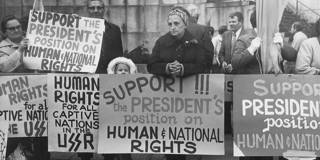Because gross violations of human rights are central to governance in China and Russia, the United States should recognize that its own commitment to internationally accepted norms is a key source of strength. As the history of the Cold War shows, a US foreign policy that advances such principles is far more likely to attract allies.
NEW YORK – It is neither an accident nor a coincidence that China is committing what many call genocide against Muslim Uighurs in Xinjiang, and that Russia has jailed the dissident Alexei Navalny. The Chinese need a quiescent Xinjiang because it is a key node of their Eurasia-spanning Belt and Road Initiative. The Kremlin needs government institutions to serve as a cover for wealth accumulation by a gangster elite, and thus sees Navalny as a major threat.
Both countries are in the grip of nervous autocratic systems that cannot afford to offer second chances to anyone. In carrying out their recent abuses, both have implicitly made certain calculations of how the United States and its allies will – or will not – respond.
In twenty-first-century great power politics, a robust human-rights policy is a vital form of leverage, because gross violations of internationally accepted norms are central to governance by autocratic regimes. As such, the US must not throw away the strategic advantage conferred by its longstanding commitment to human rights.

NEW YORK – It is neither an accident nor a coincidence that China is committing what many call genocide against Muslim Uighurs in Xinjiang, and that Russia has jailed the dissident Alexei Navalny. The Chinese need a quiescent Xinjiang because it is a key node of their Eurasia-spanning Belt and Road Initiative. The Kremlin needs government institutions to serve as a cover for wealth accumulation by a gangster elite, and thus sees Navalny as a major threat.
Both countries are in the grip of nervous autocratic systems that cannot afford to offer second chances to anyone. In carrying out their recent abuses, both have implicitly made certain calculations of how the United States and its allies will – or will not – respond.
In twenty-first-century great power politics, a robust human-rights policy is a vital form of leverage, because gross violations of internationally accepted norms are central to governance by autocratic regimes. As such, the US must not throw away the strategic advantage conferred by its longstanding commitment to human rights.